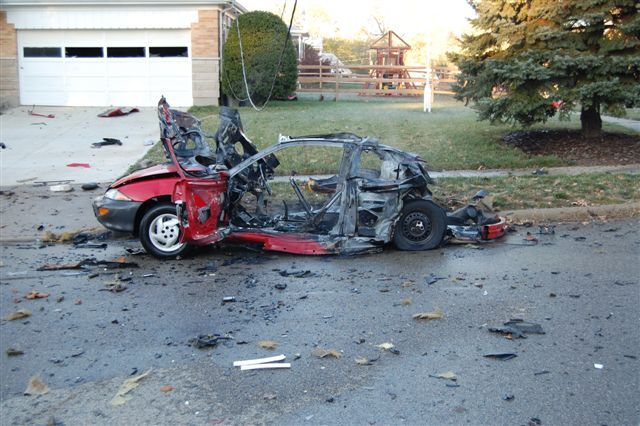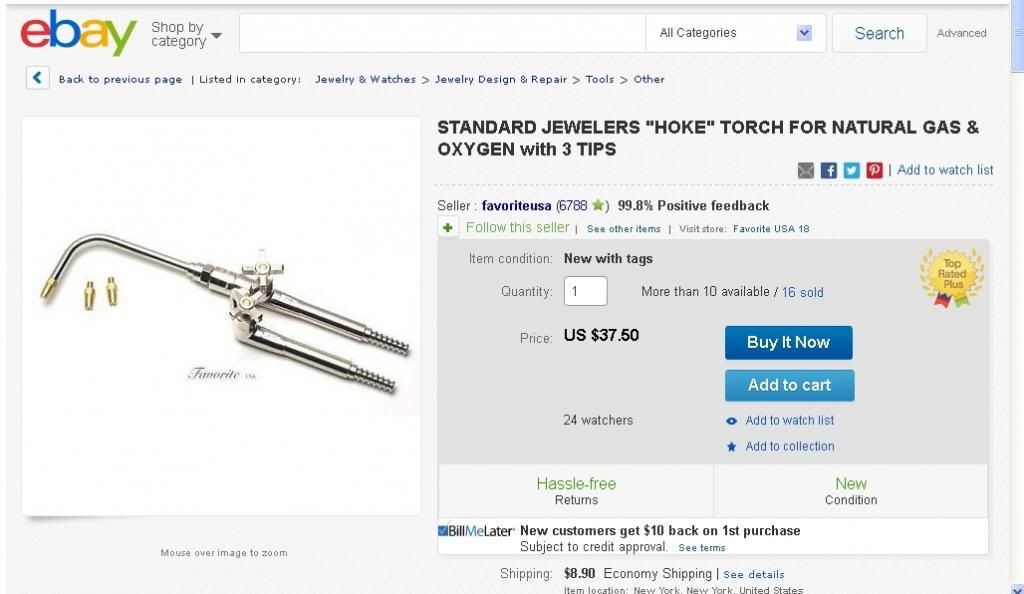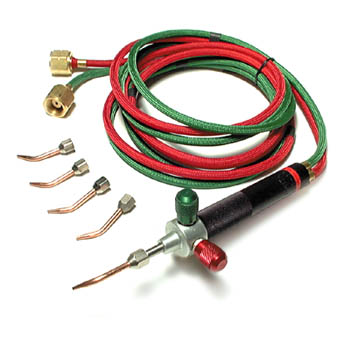|
|
Post by bobby1 on Dec 8, 2013 0:47:29 GMT -5
Most fire districts forbid any propane tanks within an occupied dwelling (ever wonder why they put your home heating tank 50 to 100 feet away from your house?). Of the fuel gasses that we use in our hobbies most are lighter than air so when you have a leak the combustible gas rises and mixes with the air in the room. It takes a considerable leak to get to an explosive mixture. Propane on the other hand is heavier than air so it drops to the floor and pools there. It takes very little to become an explosive mixture. Other than propane most fuel gasses probably are allowed in your home within certain quantities. All ultimately will cause an explosion if enough gets leaked into the room but it only takes a very little for propane. A fire resulting from having propane in your house won't be covered by your insurance. Always check with the local fire district and your insurance company for what their limits on these tanks in your home. Acetylene generally isn't any more hazardous than other gasses. My first torch was a air/acetylene one but when I needed to do more delicate work I went to a smith torch with oxy/acetylene. I do use a very large air/acetylene torch to do my casting because it uses much less oxygen in the flame. Molten silver has a love affair with absorbing oxygen and the resultant casting can easily have porosity problem when the dissolved oxygen comes out of the solution.
Bob
|
|
|
|
Post by roy on Dec 8, 2013 12:23:40 GMT -5
Acetylene in the trunk of your car...  Transport and store acetylene carefully! Lee wow lee what happined to your car ! after working in a radiator shop for the last 30 years i switch the little smith torch my wife bought me last year to propain that way you wont have black soot all over your walls in the shop or house it is easy to do burns just as hot and cleaner |
|
|
|
Post by bobby1 on Dec 8, 2013 14:04:35 GMT -5
The soot from an acetylene torch can be easily avoided. When you light the torch open the oxygen valve slightly, open the acetylene valve slightly and light your flame. It will start burning very clean. No fuel gas burns hotter than acetylene..... Bob  |
|
gemfeller
Cave Dweller 
Member since June 2011
Posts: 4,059 
|
Post by gemfeller on Dec 8, 2013 14:36:50 GMT -5
No fuel gas burns hotter than acetylene..... Bob And that's my problem with it Bob. It's too hot for the kind of work I do. But different strokes, eh? I much preferred using natural gas/oxy but my present set-up isn't piped for it. Rick |
|
|
|
Post by 1dave on Dec 8, 2013 15:51:50 GMT -5
Many Silversmiths use the Hoke torch.  |
|
|
|
Post by Rockoonz on Dec 8, 2013 16:00:29 GMT -5
The soot from an acetylene torch can be easily avoided. When you light the torch open the oxygen valve slightly, open the acetylene valve slightly and light your flame. It will start burning very clean. No fuel gas burns hotter than acetylene..... Bob  Melting Points of silver solders are as follows: Easy: 1325: Medium: 1390: Hard: 1475: Extra hard: 1540 Annealing copper requires 1400 to 1700 degrees F All the fuel sources on the list are sufficient without oxygen. I have acetylene but it's only for use with steel. The tank lives in a shed 75 feet from the house when not in use The one advantage of acetylene is the smaller molecules and the ability to use a smaller tip to focus heat to a small area, good if you do a lot of fusing. Lee |
|
|
|
Post by Donnie's Rocky Treasures on Dec 8, 2013 17:08:45 GMT -5
Although I haven't used it yet, I got an Orca to use with a disposable propane tank. Has anyone one else used it? tinyurl.com/o4u5696 |
|
|
|
Post by bobby1 on Dec 8, 2013 23:43:46 GMT -5
I really like the hotter flame from acetylene because it allows me to use a smaller tip and smaller flame especially when I'm retipping prongs in a ring. I don't have to expose the whole ring to high temperatures to get enough heat to get the tip repaired.
Bob
|
|
gemfeller
Cave Dweller 
Member since June 2011
Posts: 4,059 
|
Post by gemfeller on Dec 9, 2013 1:09:10 GMT -5
As I said, different strokes. I have no problem doing prong work with propane or NG. No one has a patent on methods or technique. We all develop our own style based on equipment, knowledge, skill and experience. If you prefer acetylene, by all means use it.  |
|
|
|
Post by rockpickerforever on Feb 13, 2014 11:49:13 GMT -5
Someone just emailed this to me. Thought it belonged here, so had to go searching for this thread. Man, I am amazed at how quickly this topic took off. Congrats everyone, you are all winners!
|
|
Tom
fully equipped rock polisher
   My dad Tom suddenly passed away yesterday, Just wanted his "rock" family to know.
My dad Tom suddenly passed away yesterday, Just wanted his "rock" family to know.
Member since January 2013
Posts: 1,557
|
Post by Tom on Feb 13, 2014 17:44:08 GMT -5
Wow that's scary yet cool, wonder how the driver made out?
|
|
dshanpnw
fully equipped rock polisher
  
Member since December 2020
Posts: 1,157
|
Post by dshanpnw on Jun 24, 2024 11:36:55 GMT -5
It's pretty hard to debate which torch/gas is best as they all have their good and bad points and capabilities. Being a retired pipefitter I had 3 "B" tank set-ups like this,,, gBSJRhDen,Q~~60_35.JPG) Not knowing a thing about working with silver I went to this shop in Avon,Ct. and asked Richard Parker to get me off the ground,,,,,,, www.littlesilvershop.com/I found Richard to be a pretty "gruff' guy but he was using the same torch set-up I had and showed me a few things,,,to get me off the ground. I tried using this torch set-up for about 6 months and almost quit because I was getting very frustrated trying to control what I wanted to heat and what I didn't want to heat.It seemed to me that no matter what tip I used it wasn't small enough and I have the smallest tips available for this type of torch!! I did a bit of research and ended up buying Smiths,,The Little Torch with oxy/acet hook up,,,,  It took me a little time to get used to the difference in "intensity" of the flame but in time I learned to like it a lot. Everything on this page(except the wire wrapped pieces)was done using the Little Torch,,, imageevent.com/tcknkk/jewelry?n=0&z=2&c=4&x=1&m=24&w=0&p=0This isn't jewelery but everything here was also done with the same torch,,,, imageevent.com/tcknkk/metalworkartI've soft soldered,silver soldered,brazed and even gas welded steel with this torch. Those are the "pro's",,,the "con's" are it isn't very good for annealing bigger pieces.I tried annealing 6" square pieces of 16 and 18 guage copper with the biggest tip and ended up using the "B" tank set-up with a big tip. Another point is the black carbon when lighting the torch.Although it is NOT the proper way to light this type of torch/gas,,,I turn the oxygen on just a tad before turning on the acetylene and lighting the torch.This cuts down,or even eliminates the black carbon. The alternative to oxy/acet is oxy/propane BUT you CAN NOT store propane indoors.It's against the law and I would imagine that if there was a fire the insurance company wouldn't pay for the damage. About insurance companies and acetylene in the home,,,,,,I don't know for a fact about this subject,,,, but there are a LOT of plumbers and pipefitters who have "B" tanks in their basements,,,,like me! I think what you may have heard was referring to propane and not acetylene. It's a lot to think about and can be an expensive investment. It would be great if all of us could try different torches and gasses before we spend the money but in most cases we can't and have to rely on research. Some people do fine with a "B" tank set-up,,,some don't. connrock Hello connrock, I am brand new to silversmithing and I am trying to decide on the right torch for me. I'm looking into the Smith Little torch with acetylene and oxygen. The kit Rio Grande sells has a 10CF acetylene tank and a 20CF oxygen tank, how often would I need to refill them if I were to crank out let's say three pendants a week? Or, how long would tanks that size last you? Thanks so much.
Doug
|
|
|
|
Post by opalpyrexia on Jun 24, 2024 13:28:59 GMT -5
dshanpnw , do you happen to heat your home with natural gas? If so, why not have a plumber run a line into your shop. I use NG + O2 for soldering and even casting. The only tank that I have is O2 propane for casting. I have a propane tank outside in a cage and, when casting, I crack a door and run the propane hose into the shop for casting. If you purchase the Smith Little Torch, whether for NG or propane, you should seriously consider adding these tips plus adapter: Paige Tools. He has tips that are optimized for jewelry use with either NG or propane.
I use an old Meco Midget torch. I don't think that they are available any more.
|
|
dshanpnw
fully equipped rock polisher
  
Member since December 2020
Posts: 1,157
|
Post by dshanpnw on Jun 24, 2024 14:07:17 GMT -5
dshanpnw , do you happen to heat your home with natural gas? If so, why not have a plumber run a line into your shop. I use NG + O2 for soldering and even casting. The only tank that I have is O2. If you purchase the Smith Little Torch, whether for NG or propane, you should seriously consider adding these tips plus adapter: Paige Tools. He has tips that are optimized for jewelry use with either NG or propane.
I use an old Meco Midget torch. I don't think that they are available any more.
Thanks, and I do have natural gas in the house. I'm guessing you prefer propane or NG over acetylene? |
|
|
|
Post by opalpyrexia on Jun 24, 2024 14:44:44 GMT -5
dshanpnw , do you happen to heat your home with natural gas? If so, why not have a plumber run a line into your shop. I use NG + O2 for soldering and even casting. The only tank that I have is O2. If you purchase the Smith Little Torch, whether for NG or propane, you should seriously consider adding these tips plus adapter: Paige Tools. He has tips that are optimized for jewelry use with either NG or propane.
I use an old Meco Midget torch. I don't think that they are available any more.
Thanks, and I do have natural gas in the house. I'm guessing you prefer propane or NG over acetylene? Yes, I wouldn't mess with acetylene. Regarding my NG suggestion, buying small propane tanks from a hardware store would probably be a better way to go. I added an NG line because I intended to do a lot of smithing.
|
|
gunsil
spending too much on rocks
 
Member since January 2023
Posts: 345
|
Post by gunsil on Jun 24, 2024 18:06:28 GMT -5
I've been making jewelry for 45 years, sterling, fine silver, and gold. I make everything from tiny earrings to large sterling bracelets and belt buckles that weigh four ounces, sometimes more. I use a couple B tank acetylene set ups, one Smith's and the other Prestolite. I use the Smiths for small work and both units with large tips for the big buckles and bracelets. Sometimes you need a lot of heat sometimes you don't, I have a friend who uses the Smiths B tank set up and when he needs more heat for large pieces he adds flame from a MAP gas torch from Home Depot. You can also get the smaller MC acetylene tanks if the Bs take up too much room.I agree that oxy/acetylene is too hot for precious metal work.
|
|
rockbrain
Cave Dweller 
Member since January 2022
Posts: 3,167
|
Post by rockbrain on Jul 2, 2024 21:07:38 GMT -5
I'm looking at torches but already have a few at work. Would love to use one of them. I also have a few B tanks and several MC tanks. I have a Turbotorch setup with 3 different size tips. I was wondering if that might be useful with the small tip. I also already have a couple of small oxy acetylene setups. I hate to buy something new if one of these would work but I'm just getting started and I'm pretty ignorant about what I need.
|
|
|
|
Post by liveoak on Jul 7, 2024 6:20:13 GMT -5
I started with the Smith little torch & disposable tanks.
Once they changed the MAP gas a number of years ago, I found unless I was doing something very small, I couldn't get enough heat, especially for soldering copper. So I switched to straight acetylene using a Prestolite torch. I was able to get all the sized tips.
I'm really happy with the Prestolite. I think the key to any torch is having different sized tips.
Since I work only in copper, I found you need more heat than you think.
Patty
|
|
ThomasT
has rocks in the head
  
Member since June 2022
Posts: 616
|
Post by ThomasT on Jul 8, 2024 8:56:15 GMT -5
Having a selection of tips is probably the most important thing. A rosebud tip is important if you are hammering or rolling sheets of metal.
|
|